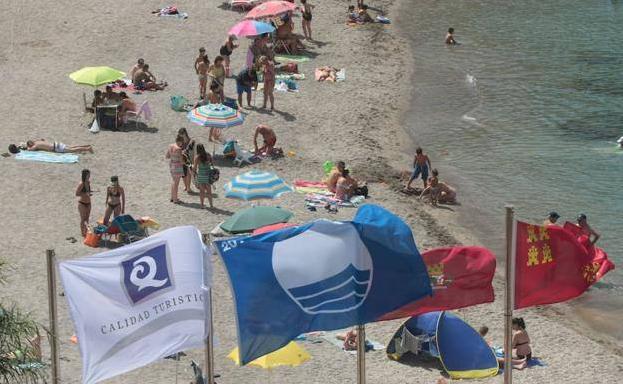The Mar Menor has maintained exactly the same number of blue flags that it achieved last year amounting to a total of 31, 25 of which are for beaches and the remainder to marinas.
Águilas , with 11 blue flags, is still the municipality with the most awards, 9 for beaches (Las Delicias, Levante, La Colonia, Poniente, Calarreona, Matalentisco, La Higuerica, La Carolina and La Casica Verde) and 2 for marinas (the Club Náutico de Águilas and the Puerto Deportivo Juan Montiel).
Mazarrón has 8 beaches (Rihuete, El Puerto, Bahia, Nares, Grande-Castellar, Alamillo, El Mojon and Percheles) and the two marina’s that were incorporated last into the quality system last year, the Club de Regatas de Mazarrón and the Marina of Mazarrón.
Cartagena maintains its 5 beaches (Cala Cortina, Isla Plana, Levante in Cabo de Palos, San Ginés and Playa del Cuartel) and the Real Club de Regatas de Cartagena. San Pedro del Pinatar has 2 flags, one for El Mojón beach and one for Marina Salinas.
Lorca retains a blue flag for Calnegre’s cove, and San Javier for La Ensenada del Esparto.
In total, Spain obtained a total of 669 blue flags (566 beaches, 98 marinas and five tourist boats) that will fly from June, which represents a decrease of 28 compared to last year. More than 100 ‘Blue Flags’ have been flying at Spanish beaches for ten or more years while seven have earned their accolade for the first time.
Globally, in the northern hemisphere, a total of 4,559 blue flags have been awarded, 138 more than in 2018 in the 45 participating countries. Of these, 3,797 are for beaches (+110), 695 for ports (+16) and 67 (+12) for sustainable tourist vessels.
Of the blue flags awarded in the northern hemisphere, Spain represents 16%. Although only one of every five Spanish beaches will fly a Blue Flag this summer, one of every six that in the world, will do so on the Spanish coast.
In Spain, and by communities, the Valencian Community has the largest number of flags this summer (150 in total), followed by Catalonia (120 flags), Galicia (119 flags), Andalusia (98 flags), Balearic Islands (63) , Canary Islands (49) and Murcia (31). Next comes Asturias (13), Cantabria (eleven), País Vasco (five), Melilla (four), Extremadura (three), Madrid (1) and Ceuta (1).
The data was released on Tuesday in Madrid by the Association of Environmental and Consumer Education (Adeac) – the Spanish section of the European Federation of Environmental Education – which ensures that beaches, marinas and sustainable boats in Spain still maintains first place in the world ranking.





